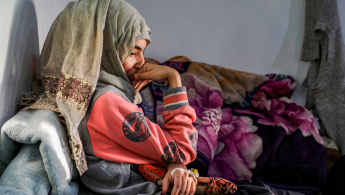Disfigured by acid, the face of violence against Yemen's women
Now aged 19, the Yemeni woman agreed to relate her ordeal at the hands of her abusive husband - rare testimony in a country where domestic violence is largely hidden.
"He grabbed me by the hair and poured the acid on me while laughing," she told AFP as she sat with her veil framing a face badly scarred by last October's assault that also left deep wounds on her body.
"I went through hell," she said, describing her years of marriage which she said she spent chained and often beaten.
When her father died, Al-Anoud's mother remarried and then hurried to find a husband for her daughter.
"She wanted to protect me," she said.
Having lived for four years as a "slave", Al-Anoud was eventually kicked out by her husband, taken in by her sister and began training as a nurse.
But her ex-husband decided he wanted her back, and when she refused, he took his revenge.
After being hospitalised in a clinic where she had once been employed, Al-Anoud is now waiting to undergo the three plastic surgery operations needed to repair some of the damage.
Her doctor Moutawakal Chahari said the procedures will be complex and expensive, and even the bills for the first aid she received had not yet been paid.
Apart from this, he stressed the "irreparable psychological effects" of her ordeal.
Twitter Post
|
A grim tally
Al-Anoud filed a complaint against her ex-husband after the attack, but he vanished and remains at large.
She is hoping that someone, anyone - a humanitarian agency, one of the stretched government services, or a grassroots non-government group - can give her the financial assistance she needs.
"I want the police and the courts to punish the criminal who did this, but I also want to reclaim my youth, my studies and my work. I want to regain my life," she said.
Child marriage is a feature of Yemeni society but six years of war, which has left the country on the brink of famine, has made it more common and "greatly increased" violence against women, said Tayseer Walid of the Yemeni Women's Union in Sanaa.
Families are forced to "rid themselves of the expense of children, especially girls, because of poor financial situations", she told AFP.
Many organisations advocating for women and girls had to shut down after war broke out, and those which struggle on do so with scant resources to address the daunting legal, medical and psychological needs.
When it comes to the status of women in Yemen, the numbers speak for themselves. A UN survey conducted in 2013 found a third of Yemeni women aged 24-32 were married before the age of 18, and nine percent of those were married before 15.
UNICEF has estimated that in 2020 Yemen had some four million married children, 1.4 million of them under 15.
Cry for help
In a 2020 report, the United Nations Population Fund (UNFPA), which deals with sexual and reproductive issues, estimated that 2.6 million women and girls are at risk of gender-based violence in Yemen.
It pointed out that in the era of Covid-19, with lockdowns that cause great strain, "cases of domestic violence are on the rise".
The grinding conflict between Iranian-backed Houthi rebels and the government supported by a Saudi-led military coalition has left tens of thousands of people dead and millions displaced.
It has plunged the country - the poorest on the Arabian Peninsula - into the world's worst humanitarian crisis, according to the UN, which has expressed fears that some "16 million people will go hungry" in 2021.
While violence against women is one of the hidden facets of the humanitarian crisis, the UN Development Programme (UNDP) has launched one of the few initiatives to combat this phenomenon.
With the support of the Japanese government, it has launched a mobile app to provide counselling to survivors of gender-based violence throughout Yemen, saying that attacks on women and girls have increased 63 percent since 2015.
Read also: Lebanese fashion model killed in suspected femicide
The application, first tested in the country's south which is in government hands, directs victims to protection and support services.
Agencies contributed to this report.



![sudan women [getty] sudan women [getty]](/sites/default/files/styles/image_330x185/public/media/images/5019D7F4-52AF-4377-8A05-885D27476479.jpg?h=d1cb525d&itok=tKXV7r-W)